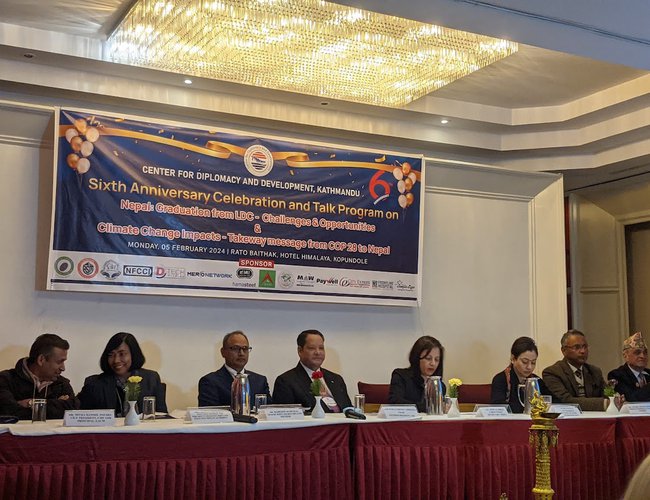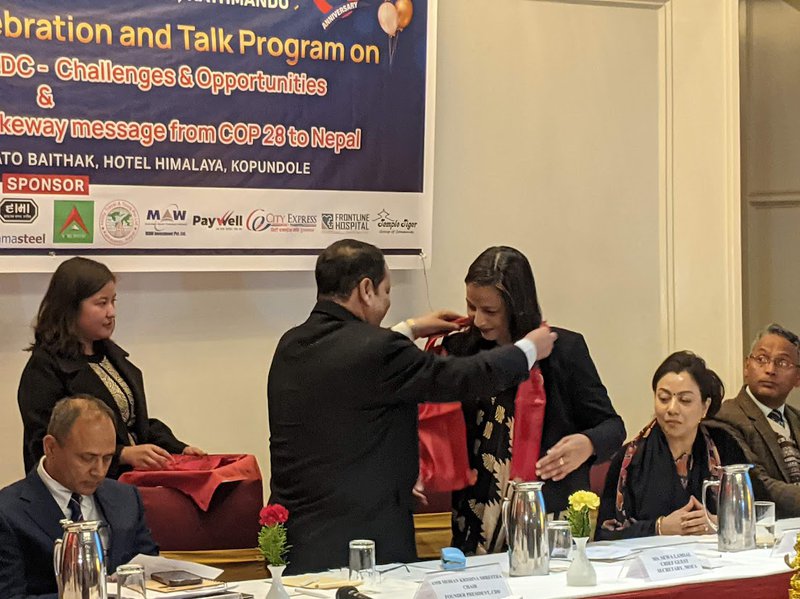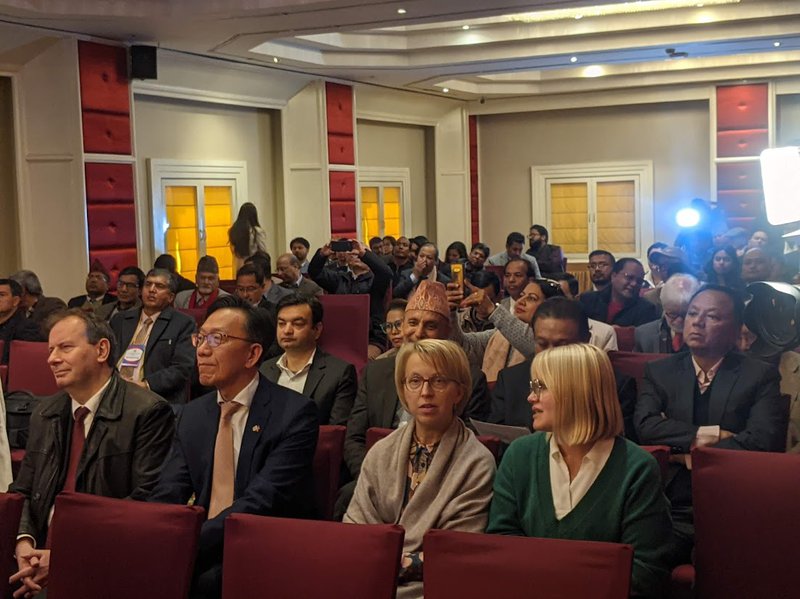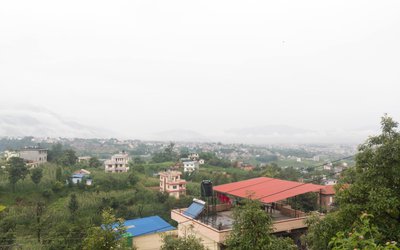
We, at CDD, are also very happy to welcome Sewal Lamsal, new Foreign Secretary at the Ministry of Foreign Affairs. We worked together at the Ministry when I was the Chief of Protocol 14 years ago. It is, indeed, a great pleasure and honor for me to welcome her at this program as Chief Guest. Lamsal has created a history as the first woman foreign secretary of Nepal. We congratulate you, Madam Foreign Secretary, for your achievement and wish you all success in your new responsibility.

I come from diplomatic service and possess 31 years of professional experience. Have travelled to 74 countries and garnered extensive practical experience. After retirement from active duty, I really wanted to share my experience. I am retired now, but not tired from thinking good and acting good. To achieve this purpose, I did two works. One is to write a book titled Three Decades in Diplomacy which was already published in October 2015 in Nepali language and it is being published in other languages including English soon. Another step was to establish this Center for Diplomacy and Development together with my friends from different disciplines. I am pleased to inform that CDD is marching ahead to disseminate knowledge in the foreign affairs, diplomacy and in other areas of topical importance in our country and beyond.

Today, we are celebrating sixth year of CDD's founding and also hosting a Talk program on two very important issues: Nepal's graduation from LDC to developing country status and Climate Change Impacts. After sometime, two eminent experts on these subjects will be presenting their erudite views. I, therefore, will refrain from making any specific comments.
Nepal is a naturally beautiful country. She has numerous natural resources. These stem from agriculture to bio-diversity to hydropower and to tourism in particular. Lately, Information technology has also emerged as a prospective business for promotion at home and abroad. Last year, our entrepreneurs exported IT softwares worth 67 billion rupees. After years in limbo, hydropower generation sector has shown a very promising picture. Few years back, we faced load-shedding, even up to for 18 hours a day. Now, this is the story of the past. Due to changes in the policies, Nepal has developed its capacity to export electricity to India and Bangladesh. Tri-partite agreement between our three countries present a very rosy picture for accelerating development tempo on a mutually reinforcing basis. Similarly, tourism is yet another very bright spot. Nepal can attract many tourists from all over the world. Our numerous tangible and intangible cultural, religious and natural heritages provide a fascinating prospect for tourism development. Arrival of a million tourists cannot be a matter of complacency, as prospects are too high. With excellent weather with six seasons, clean and chilly water flowing from Himalayas, Nepal has best conditions for developing and producing the best agriculture and horticulture products.
These are bright scenarios of our country. But, it is very painful to note that since last 50 years, Nepal has remained a resource poor, inefficient and least developed country. Not that we did not have any resources or talent for development. Reality is that due to lingering political instability, lack of good leadership and inefficient bureaucracy, economic development is not catching fast tempo. Elephantine bureaucracy, in fact, hinders our development process. Good rules are in paper, but their poor implementation always blocs smooth development process.
Barely three years from now on 24 November 2026, Nepal is slated to upgrade from a least developed to a developing country status. This promotion, indeed, will be a morale booster. Our excellent speaker Mr Chandra Ghimire will be presenting facts and figures with regard to LDC graduation. Of course, this opportunity is coming with formidable challenges. But talent and expertise of Nepali people can turn such challenges into opportunities. After graduation, Nepal is supposed to lose many facilities in trade areas. But it also provides an opportunity to reshape our way of thinking. We can also find new avenues to move ahead to deal with emerging challenges, particularly, in trade areas.
I am sure, with concerted efforts of our government and our private sector, Nepal could tackle such challenges efficiently and seize this opportunity to enhance her image. If we loose somewhere, we must try to get more in another areas. We have many advantages in many fields. We must enhance our capacity in the areas where we have competitive and comparative advantages. Effective implementation of the economic diplomacy with six focussed objectives i.e. promotion of tourism, exports, FDI, foreign employment opportunities and increment in foreign aid provides an excellent platform for accelerating our development pace in the coming days.
Another important topic is climate change impacts. We have invited Dr. Maheswar Dhakal, a noted expert on the subject. Climate change is creating havoc everywhere in the world. Climate change can pose threats even to the existence of humankind. Devastating floods, landslides, hurricanes and many other natural disasters claim precious human lives and properties. Our country is also not immune from natural disasters. Warm climate is melting snows in the Himalayas. I remember one President of a French company told me in Paris that, within next few years, they will need to travel to Nepal to see snows. Nepal does not contribute to global warming, but she is a victim by global phenomena. Our government had sensitized problems caused by global warming. Further, Nepal is seeking compensation in this regard. But when such logical demand will be met from the international community. This is a rightful question.
Now, I wish to recall an event. To sensitize about the growing negative effects of global warming, our government hosted a Cabinet meeting at the foothills of the Himalayas on 4 December 2009. Maldives also hosted a unique Cabinet meeting under sea to sensitize about the effects of global warming.
Global warming is a serious scourge with manifold ramifications. It affects all countries and people. It is, therefore, incumbent on all governments and people to give a serious thinking to mitigate effects of global waming for our common survival. Global concerted efforts are necessary to combat such problems.
Before concluding, I, once again, wish to express my sincere thanks to all our distinguished guests for your kind attention.
Shrestha is a founder President and Former Ambassador of Nepal to France. Excerpts of the statement delivered at the Sixth Anniversary and Talk Program.
- FDI And Development In Nepal
- Jul 13, 2023

















